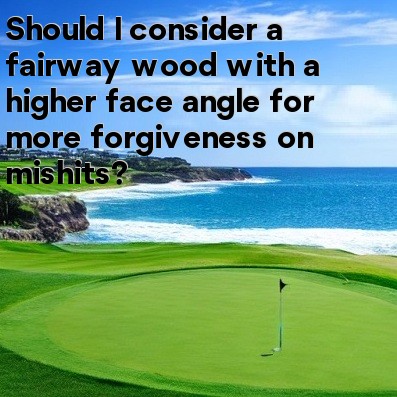
In golf, Should I consider a fairway wood with a higher face angle for more forgiveness on mishits?
When it comes to choosing the right fairway wood, forgiveness is an important factor to consider. A higher face angle can indeed provide more forgiveness on mishits, but let's explore this topic in more detail.
First, let's understand what a face angle is. The face angle of a golf club refers to the direction the clubface is pointing in relation to the target line. A higher face angle means the face is more closed, while a lower face angle means the face is more open.
Now, when it comes to fairway woods, a higher face angle can provide some benefits. One of the main advantages is the added forgiveness it offers on off-center shots. When you hit the ball towards the toe or heel of the clubface, a higher face angle can help correct the ball's flight and reduce the side spin, resulting in a straighter shot.
Additionally, a higher face angle can help golfers who struggle with slicing the ball. By closing the face slightly at address, it becomes easier to square the clubface at impact, mitigating the effects of a slice. This can lead to more consistent and accurate shots off the tee or from the fairway.
However, it's important to note that the choice of a fairway wood should be based on your individual needs and playing style. While a higher face angle can be beneficial for some golfers, it may not suit everyone. Factors like swing mechanics, handicap, and shot shape preferences all play a role in determining the right club for you.
It's always recommended to try out different fairway woods and see how they feel and perform for you. Visit a local golf store or take advantage of a fitting session to get personalized recommendations based on your swing characteristics.
Apart from face angle, other factors also contribute to forgiveness in fairway woods. These include the design of the clubhead, the size of the sweet spot, and the overall perimeter weighting. Some fairway woods are specifically engineered to provide maximum forgiveness, while others offer more workability and shot-shaping capability.
Ultimately, the best fairway wood for you is the one that gives you confidence, consistency, and the desired ball flight. Don't solely rely on face angle as the determining factor but consider it as part of the equation when making your decision.
In conclusion, a fairway wood with a higher face angle can indeed provide more forgiveness on mishits. It helps correct off-center shots and can reduce the effects of a slice. However, the choice of fairway wood should always be based on your individual needs, swing characteristics, and preferences. Take the time to test different options and seek professional advice to ensure the best fit for your game.





